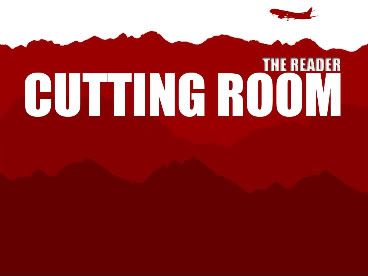Movie Review: Shutter Island
Here's Ben's take on Shutter Island. He was the lucky bastard who got to review Scorsese's latest. I'd say more, but I think that's what we paid Ben for.
Shock Treatment
Island life is chilling for DiCaprio
Ben Coffman
Martin Scorsese is a director who can do whatever he likes—a three-hour William Hung biopic? It’s his, if he wants it. In Hollywood, his name is synonymous with quality filmmaking and, nowadays, cold, hard, delicious cash. His newest film Shutter Island is a genre flick, to be sure (its closest analog in Scorsese’s 20-some film canon is likely 1991’s Cape Fear), but it’s a psychological thriller on steroids—creepy, horrifying steroids.
The year is 1954, and Leonardo DiCaprio plays Teddy Daniels, a U.S. marshal assigned to investigate the disappearance of a woman from an Alcatraz-style insane asylum in Boston Harbor. When we first meet Daniels, a rough ferry ride has left him green around the gills. A storm is brewing, but DiCaprio’s grimacing and chain smoking hints at something more than stomach-turning sea sickness. He is a haunted man, still bothered by his memories of World War II, including the liberation of Dachau. Did I mention that his wife also recently died?
With arguably the worst cigarette-smoke-and-dry-heave breath in cinematic history, he meets his new partner, fellow marshal Chuck Aule (Mark Ruffalo). Together, they disembark from the ferry and embark on a nightmarish journey that involves all things creepy: dark and stormy weather, insane asylums with chained murderers, creaky doors, mice, and hallucinations featuring little dead girls.
In Shutter Island, Scorsese cut the genre’s fat, leaving only the best aspects of the psychological thriller—gripping tension, a moody tone and chilling discoveries. The film touches a lot of bases, starting out as a mystery with some supernatural and even horror overtones before it evolves fully into a nuanced thriller. To get there, Scorsese explores new territory, creating eerie, dreamlike sequences reminiscent of David Lynch or Tarsem Singh’s The Cell.
Despite a shift in genre, Scorsese’s use of DiCaprio in the lead role, the pair’s fourth collaboration in the past 8 years, isn’t surprising. Although at first blush, the baby-faced actor doesn’t look the role of a grizzled war veteran and federal agent, with the help of stooped shoulders and the ability to seemingly break into a cold sweat on cue, DiCaprio fully owns his character.
Screenwriter Laeta Kalogridis’s adaptation of Dennis Lehane’s novel includes all of the necessary twists, but it is Scorsese’s surreal, trippy vision of his lead character’s psychological hell that gives the film its nightmarish qualities. In a month in which theaters are traditionally dominated by last year's Oscar nominees and this year's soon-to-be-forgotten flicks, Shutter Island is a pleasant surprise.
Grade: A-

Shock Treatment
Island life is chilling for DiCaprio
Ben Coffman
Martin Scorsese is a director who can do whatever he likes—a three-hour William Hung biopic? It’s his, if he wants it. In Hollywood, his name is synonymous with quality filmmaking and, nowadays, cold, hard, delicious cash. His newest film Shutter Island is a genre flick, to be sure (its closest analog in Scorsese’s 20-some film canon is likely 1991’s Cape Fear), but it’s a psychological thriller on steroids—creepy, horrifying steroids.
The year is 1954, and Leonardo DiCaprio plays Teddy Daniels, a U.S. marshal assigned to investigate the disappearance of a woman from an Alcatraz-style insane asylum in Boston Harbor. When we first meet Daniels, a rough ferry ride has left him green around the gills. A storm is brewing, but DiCaprio’s grimacing and chain smoking hints at something more than stomach-turning sea sickness. He is a haunted man, still bothered by his memories of World War II, including the liberation of Dachau. Did I mention that his wife also recently died?
With arguably the worst cigarette-smoke-and-dry-heave breath in cinematic history, he meets his new partner, fellow marshal Chuck Aule (Mark Ruffalo). Together, they disembark from the ferry and embark on a nightmarish journey that involves all things creepy: dark and stormy weather, insane asylums with chained murderers, creaky doors, mice, and hallucinations featuring little dead girls.
In Shutter Island, Scorsese cut the genre’s fat, leaving only the best aspects of the psychological thriller—gripping tension, a moody tone and chilling discoveries. The film touches a lot of bases, starting out as a mystery with some supernatural and even horror overtones before it evolves fully into a nuanced thriller. To get there, Scorsese explores new territory, creating eerie, dreamlike sequences reminiscent of David Lynch or Tarsem Singh’s The Cell.
Despite a shift in genre, Scorsese’s use of DiCaprio in the lead role, the pair’s fourth collaboration in the past 8 years, isn’t surprising. Although at first blush, the baby-faced actor doesn’t look the role of a grizzled war veteran and federal agent, with the help of stooped shoulders and the ability to seemingly break into a cold sweat on cue, DiCaprio fully owns his character.
Screenwriter Laeta Kalogridis’s adaptation of Dennis Lehane’s novel includes all of the necessary twists, but it is Scorsese’s surreal, trippy vision of his lead character’s psychological hell that gives the film its nightmarish qualities. In a month in which theaters are traditionally dominated by last year's Oscar nominees and this year's soon-to-be-forgotten flicks, Shutter Island is a pleasant surprise.
Grade: A-
Labels: Ben Coffman, dennis lehane, Leonardo DiCaprio, Martin Scorsese, movie review, Shutter Island, Shutter island review



0 Comments:
Post a Comment
Subscribe to Post Comments [Atom]
<< Home